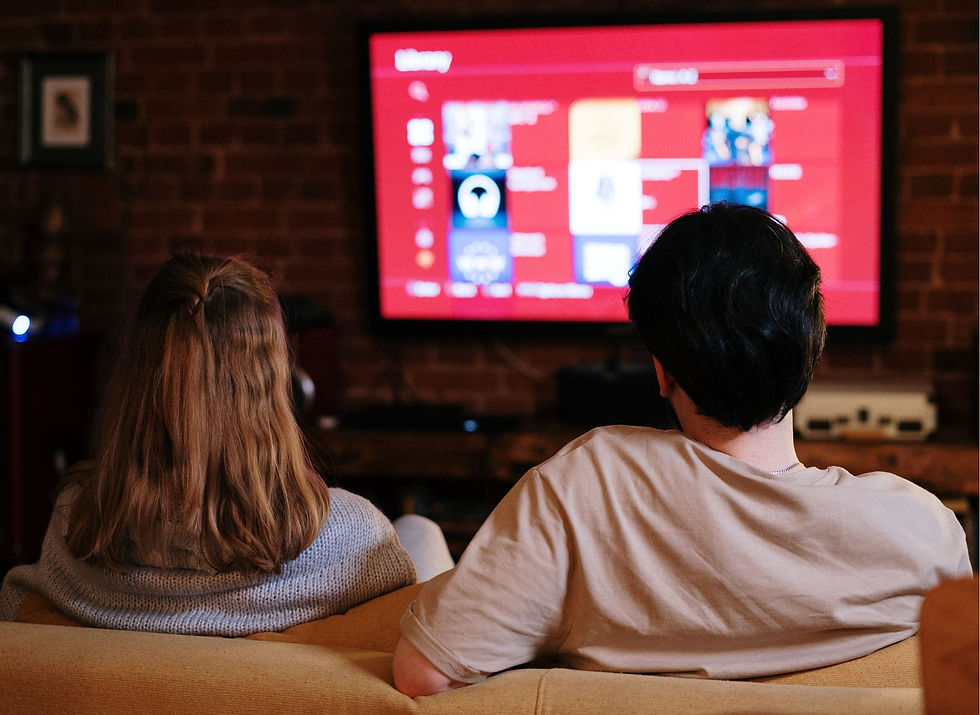What Internet Speed Do You Really Need for Buffer-Free Streaming in the UK?
- Alex Mason - Investing & Financial Growth Writer

- Mar 6
- 4 min read
Updated: May 29
Streaming services are now a central part of home entertainment in the UK, but nothing ruins the experience like constant buffering or a blurry picture. Whether you're catching up on BBC iPlayer, bingeing on Netflix, or streaming in 4K on YouTube, having the right internet speed is crucial. But how much do you really need?
In this guide, we'll explain internet speed requirements for popular platforms, how to avoid overpaying for broadband you don’t need, and how to improve performance even on slower connections.

What Does "Internet Speed" Mean?
Internet speed refers to how quickly data can be transferred from the web to your device. It's measured in megabits per second (Mbps). There are two main types:
Download speed: How fast you receive data (e.g., streaming video).
Upload speed: How fast you send data (e.g., video calls or uploading videos).
For streaming, download speed is the key metric.
Recommended Internet Speeds for Streaming
Here are the general speed requirements for popular streaming services in the UK:
Netflix:
Standard Definition (SD): 3 Mbps
High Definition (HD): 5 Mbps
Ultra HD/4K: 15 Mbps
BBC iPlayer:
HD (720p): 1.5 Mbps
Full HD (1080p): 5 Mbps
YouTube:
SD (480p): 1.1 Mbps
HD (720p): 2.5 Mbps
Full HD (1080p): 5 Mbps
4K: 20 Mbps
Disney+ and Amazon Prime Video:
SD: 3-4 Mbps
HD: 5-6 Mbps
4K: 15-25 Mbps
Keep in mind these figures are per device. If multiple people are streaming at once, you’ll need higher speeds.
How to Calculate What You Need
To figure out the ideal speed for your home:
Count how many devices stream simultaneously.
Multiply the highest streaming resolution used by the number of devices.
Add a buffer of 5–10 Mbps to allow for browsing or background activity.
Example: If two people stream in HD and another watches YouTube in 4K:
2 × 5 Mbps (HD) = 10 Mbps
1 × 20 Mbps (4K) = 20 Mbps
Add 10 Mbps buffer
Total = 40 Mbps minimum recommended download speed
Should You Choose Fibre Broadband?
If you're streaming regularly, fibre broadband is generally a better option than standard ADSL connections. Benefits include:
More stable connection
Higher speeds
Better handling of multiple devices
Popular fibre options include FTTC (Fibre to the Cabinet) and FTTP (Fibre to the Premises). FTTP offers the fastest speeds but may not be available in all UK areas.
Tips to Improve Streaming Without Upgrading
Before you jump to a more expensive broadband package, try these tips:
Use a wired connection: Ethernet cables are more stable than Wi-Fi.
Position your router well: Avoid placing it behind furniture or near thick walls.
Limit background activity: Pause large downloads or game updates while streaming.
Reboot your router: A regular reset can improve performance.
Use 5GHz Wi-Fi band: It offers faster speeds over short distances.
Avoid Overpaying for Broadband
Many UK households pay for speeds they don’t need. If you only stream in HD on one or two devices, you may be fine with a 35 Mbps connection. Check your usage and avoid being upsold to unnecessary premium plans.
For comparison shopping, broadband comparison tools can help you find the best deal for your speed needs. [Link: How to Compare Internet Deals in the UK]
Unique Insight: Your Router Might Be the Bottleneck
Even if you pay for high-speed internet, an outdated router can limit actual performance. Many routers supplied by ISPs aren’t designed to handle speeds over 100 Mbps. If your broadband package promises 300 Mbps but you're only getting 50 Mbps, your router could be the problem.
Investing in a modern dual-band or mesh Wi-Fi system may improve your experience more than upgrading your internet package.
FAQs
What internet speed is good for 4K streaming?
You’ll need a minimum of 15 Mbps, but ideally 20–25 Mbps for smooth playback, especially if others are online at the same time.
How can I check my current internet speed?
Use a free tool like Speedtest.net or Fast.com to measure your real-time download and upload speeds.
Does upload speed matter for streaming?
Not for watching shows or films. However, if you upload videos to YouTube or do video conferencing, upload speed becomes important.
Can I stream using mobile broadband or 5G?
Yes, but check data limits. Some plans throttle streaming quality or limit usage after a certain cap.
Will a smart TV need more speed than a tablet?
Not necessarily. It depends more on video resolution (HD vs. 4K) than the device type itself.
Final Thoughts
Getting the best internet speed for streaming isn’t about buying the most expensive plan. It’s about understanding your needs and choosing a connection that offers consistent performance for your household size and habits.
Before upgrading, take time to audit your usage, test your current speed, and rule out any hardware issues. You might be surprised how much you can improve performance without spending a penny.
Related articles
Disclaimer: Smart With Money may receive compensation through affiliate links, sponsored content, or advertising featured on this site. This does not influence our editorial standards. All reviews and recommendations are based on independent research, and we aim to provide accurate, objective information to help you make informed financial decisions.
Please note: All content on SmartWithMoney.co.uk is for informational purposes only and does not constitute financial advice. Always seek guidance from a qualified financial adviser before making any financial decisions.


